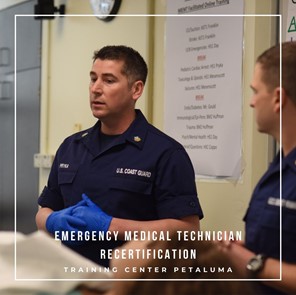Maintaining a reputation as a life-saving service, the Coast Guard certifies and recertifies hundreds of emergency medical technicians each year through the Center of Excellence for Health Services Rating at Training Center Petaluma. The credential is essential to every search and rescue mission, as crews must be prepa red to respond to those in medical distress. This year’s certification process has transitioned to accommodate pandemic-related travel and training restrictions.
red to respond to those in medical distress. This year’s certification process has transitioned to accommodate pandemic-related travel and training restrictions.
The medical school staff designed, developed, and executed a Facilitated Online Training solution to meet national registry standards for re-certifying the Coast Guard’s global network of EMTs. The initiative included representatives from the FORCECOM Health, Safety, and Work-Life (HSWL), and the rating force master chiefs from the health services technician and aviation survival technician ratings.
“I am proud of our medical school staff who’s innovative approach has leveraged technology to ensure training continued throughout this pandemic, said Capt. Steven Ramassini, commanding officer U.S. Coast Guard Training Center Petaluma. “FORCECOM and Training Center Petaluma are dedicated to innovating in the training environment to deliver a ready, relevant, and responsive workforce today and well into the future.”
In a typical year, the Force Readiness Command (FORCECOM) Medical Support School provides training and re-certification to nearly 600 students in over 17-courses.
A pilot online course was conducted over two days in March 2020, where EMT instructors discussed and demonstrated life-saving skills in front of the camera, while a team of experts operated behind the scenes, moderating online discussions and answering questions in real-time over chat.
The timeliness of this online EMT recertification course is difficult to overstate; between a critical need for additional quotas to maintain fleet currency and travel restrictions due to COVID-19, delivering this course in a virtual environment enabled the Coast Guard to overcome numerous obstacles to readiness.
From mid-November 2020 to March 2021, the EMT Instructor team will continue this process and deliver a comprehensive, four-day online course during this recertification cycle.
“Continuing to leverage technology throughout this pandemic to move the Coast Guard training system into the future has been vital to support our mission ready total workforce,” said Dr. Gladys Brignoni, Director of Force Readiness Command. “In addition, we’ve seen the potential for cost avoidance possibilities based on the reduced travel for virtual courses. For instance, over the past five years the total cost of travel for this course alone was approximately $1.8 million. Converting this to a virtual convening and eliminating travel can allow us to reinvest these travel costs to support additional courses that are best conducted in person.”
In addition to this course, FORCECOM personnel have converted more than 50 courses to virtual or blended formats since the beginning of the pandemic with additional courses still in development.
Resources:
EMT Certification School